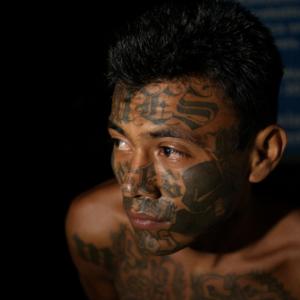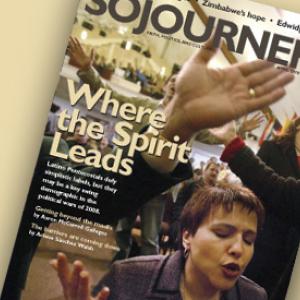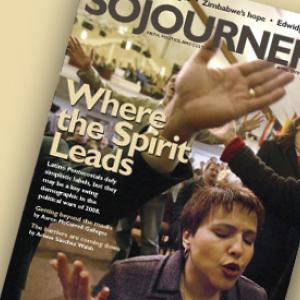Aaron McCarroll Gallegos manages social media for the United Church of Canada and was a founding member of D.C. Barrios Unidos, a gang intervention group.
Posts By This Author
From the Archives: August 1998
Football racism
A GROUP of Native Americans appeared before the Trademark Trial and Appeal Board to argue that “Redskins,” the name of Washington, D.C.’s football team, is racist and not deserving of federal trademark protection. Federal law states that a company name may not be “scandalous” or “disparaging.” ...
Offering an opinion is Chief Billy Redwing Tayac of the Piscataway Indian Nation, a Native American people who have been in the Washington area for roughly 10,000 years longer than the football team.
Cowboys, Indians, and Reconciliation?
"Buffalo Shout, Salmon Cry: Conversations on Creation, Land Justice, and Life Together"
THE DOMINANT cultures of North America have long struggled to take responsibility for the suffering and injustice inflicted upon the Indigenous Peoples of the continent. The archetypal “us/them” story of cowboys and Indians remains at the core of North American national identities, from derogatory sports mascots and symbols such as the Washington “Redskins” and the “Chief Wahoo” character of the Cleveland Indians to the ignorant “redfacing” by non-Indigenous partygoers and trick-or-treaters in contrived Indian outfits. And this situation is nowhere near ending, despite many years of cultural sensitivity training and education.
Such overt racism should never be acceptable today. Yet it persists in regard to Indigenous Peoples. Why is this? As one friend remarked to me, most modern-day Americans believe injustices done to Indigenous Peoples to be a thing of the past.
But are they? Steve Heinrichs, director of Indigenous relations for the Mennonite Church in Canada, has brought together nearly 40 theologians, activists, writers, and poets—half of whom are Indigenous—to create Buffalo Shout, Salmon Cry: Conversations on Creation, Land Justice, and Life Together, a challenging anthology on Indigenous-Christian relations, stolen land, racism, and the impending environmental crisis that we all must face together.
From 'Iron Fist' to Hand of Peace
Gangs in El Salvador call a truce from behind prison walls.
IN THE TRAGIC, often-hopeless world of gang violence, this year’s truce between two notorious gangs in El Salvador offers reasons for hope and a breakthrough opportunity for change.
Beginning in March, leaders of the infamous gangs Mara Salvatrucha (MS-13) and Barrio 18 called a truce from behind prison walls. The agreement was mediated by Monsignor Fabio Colindres, the Catholic chaplain for the Salvadoran police and military, and Raúl Mijango, a former legislator and, before that, military commander in the FMLN, the onetime guerrilla movement that is now the country’s elected ruling party.
The truce, which was still in effect at press time, immediately reduced violence in El Salvador, which has been among the world’s most deadly countries in recent years. Since early April, said President Mauricio Funes in late August, the murder rate has gone down to around five per day, a decrease of more than 60 percent from the 13.5 per day average of January and February.
The gang violence that has plagued El Salvador and other Central American countries in recent years is an import, brought by youth deported from the United States. MS-13 and Barrio 18 both originated on the streets of Los Angeles—ironically, built by young people whose families were refugees fleeing the U.S.-backed violence of Central American civil wars and death squads in the 1980s.
But just as violence can be moved across national borders, peace can be as well.
Paint Your Faith: Graffiti Art as Witness
Video About Paint Your Faith
Against the gray of concrete and stone buildings, the vibrant colors of the Paint Your Faith mural on a wall of Metropolitan United Church in downtown Toronto can be seen from blocks away.
PLUS: Latino Expressions of Faith and Justice
Latino believers don't fit a single mold, and they have expressed their faith in the world in a variety of ways.
Where the Spirit Leads
Pentecostals may be the least known and most unpredictable group on the landscape.
Holistic Healing
Barrios Unidos isn’t what most people would think of when they hear the phrase “faith-based organization.” Even though it’s not aligned with any church or traditional religi
A Reformed System?
Book Review: American Dream: Three Women, Ten Kids, and a Nation's Drive to End Welfare (Viking: 2004).
A Few of My Favorite Things
Leaving out my all-time favorites Carlos Santana and John Coltrane, whom I've written about for Sojourners, here are a few cultural artifacts I'm currently excited about.
Enlarging the Family
A Lone Wolf in Africa
How does one approach the task of writing about a continent as diverse as Africa, filled with extremes of poverty and beauty, suffering and hope?
Answers Blowin' in the Wind
Like many North American Christians, I had my spiritual journey upended in the 1980s by an encounter with poor believers from Latin America.
Honkey Payback
Honky, by Yale sociologist Dalton Conley, is a memoir of growing up during the 1970s and 1980s in the projects of New York's Lower East Side.
The Fire for Survival
Native struggles for environmental justice
Last year’s anti-World Trade Organization uprising was a reminder that there are detractors from the Pax Capitalista that currently placates some Americans with e-money and numbs others with the not-so-cheap thrills of day-trading. With unfettered consumption and development largely unchallenged, Seattle was one of those rare signs that this economic boom is leaving in its wake newly impoverished people and a devastated environment that has never been in worse shape.
All Our Relations: Native Struggles for Land and Life, by long-time Native American activist Winona LaDuke, is another disturbing signpost. This book implicates the current boomtown mentality flowing through America and cautions us to learn new ways to live in harmony with the environment and with our neighbors.
LaDuke examines the often heroic struggles of indigenous communities in North America and Hawaii to regain control of their traditional lands and resist the onslaught of "development"—which is rarely aimed at improving life for America’s Native peoples, but very often comes at the expense of their land and resources.
There are close to 200 environmental groups based in Native communities, most of them, as LaDuke says, "underfunded at best and more often, not funded at all." In these small groups, which lack the cash of their mainstream counterparts in the environmental movement (who, as this book points out, have rarely proved to be Native people’s allies), LaDuke found Native environmentalists who "sing centuries-old songs to renew life, to give thanks for the strawberries, to call home fish, and to thank Mother Earth for her blessings."




